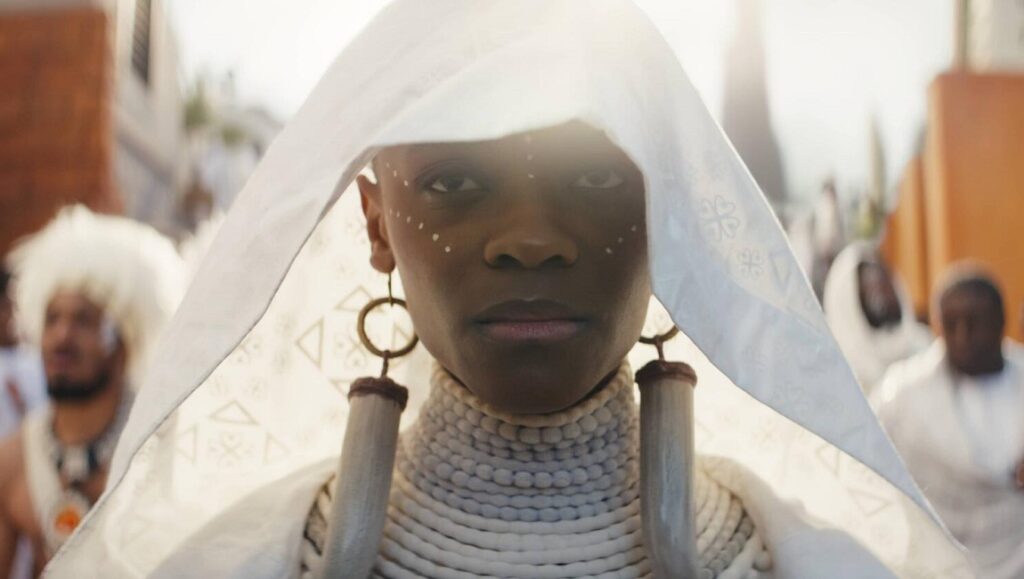Wakanda Forever rises higher than your usual MCU product, but it’s a project that ultimately works better on paper than in execution.
Everyone notes that Ryan Coogler and Marvel had a nearly impossible task ahead of them in making a sequel to Black Panther, a bona fide cultural phenomenon and genuine representational landmark in pop culture. And that was before the tragic passing of Chadwick Boseman, his absence leaving a noticeable and evidently unavoidable hole in this new film. Wakanda Forever opens with Boseman’s King T’Challa succumbing to an unknown illness, one that he might have survived if not for the destruction of Wakanda’s superpower-endowing “heart-shaped herb” that enabled him to be the Black Panther. Without it and him, the Panther is gone. His sister, tech genius Shuri (Letitia Wright), blames herself for being unable to save her brother, and mother Ramonda (Angela Bassett) must now assume the mantle of Queen.
Meanwhile, since T’Challa revealed Wakanda and its Vibranium power to the world, the world has in turn been preoccupied with stealing that power. When a cache of Vibranium is found deep under the ocean, the Americans trying to claim it are attacked by a new power: the forces of an ancient, indigenous Mesoamerican civilization called Talokan, led by the vindictive and aggressive mutant Namor (Tenoch Huerta). He blames Wakanda for exposing his people to danger, and demands an alliance to destroy the threat and possibly wage war on the rest of the outside world.
There’s admittedly real power in that premise, but it also reveals a lot about what Wakanda Forever is missing. The idea of a parallel Wakanda, a thriving-in-secret civilization built on a little-represented culture and responding to the threat — past, present, and future — of colonial violence and genocide is tantalizing, and Namor’s insistence that violence is the only solution can’t help but remind one of all the “Killmonger Was Right” memes surrounding the first film. But the Talokan people and their world are too thinly explored to feel fully realized, and Namor’s intractable demands make it difficult to see him as anything but an antagonist. A late cameo does plenty enough to make one realize that there’s more than one big hole here.
The cast does their best — Bassett is particularly memorable as the steely Queen trying to balance multiple legacies. And the film’s characterization of Namor as both menacing and shrewd — and his visual presentation as appropriately dorky, with those little wings on his feet — works as well as it can given that he seems to swing from thoughtful to psychotic on the whims of the script. But Wright struggles to find the intensity needed to take the lead here; replacing Shuri’s whiz-kid charisma with bloodlust sounds better on paper than it ends up in practice. Lupita N’yongo’s spy Nakia would have been a better choice here, but it takes nearly an hour for her to show up, and even then she’s left mostly in the background until she’s needed to serve a final moment. The less said about new character RiRi Williams (Dominique Thorne) the better, as she’s an extraneous burden on an already overstuffed script in dire need of narrative momentum, only here to set up a forthcoming streaming series. Marvel’s to stop doing this stuff.
The striking visuals Coogler brought to Black Panther are also in short supply. Most of the film is shot in close-up with a distracting shallow focus, the copious underwater sequences are murky, and the special effects in MCU movies just keep getting worse. The first film had a lot of tactility and color, but this one just looks like more streaming TV, and the production design and costumes — while significantly more elaborate here — aren’t really shown off properly. The action, as well, lacks the rambunctiousness that marks superior efforts. Despite a few arresting images, like bombs that explode into blasts of water or a fight on a sun-baked cliff, most of the action is of the CGI army vs. CGI army variety, which settles into drabness quickly. Despite the best efforts of a dedicated cast and an inarguably talented writer/director given an unusual amount of creative leeway in the lumbering behemoth that is the Marvel Cinematic Universe, Wakanda Forever lands as an at-times sluggish, unfocused struggle with the demands of both manifest destiny and grief, in both cases literally and figuratively.


Comments are closed.